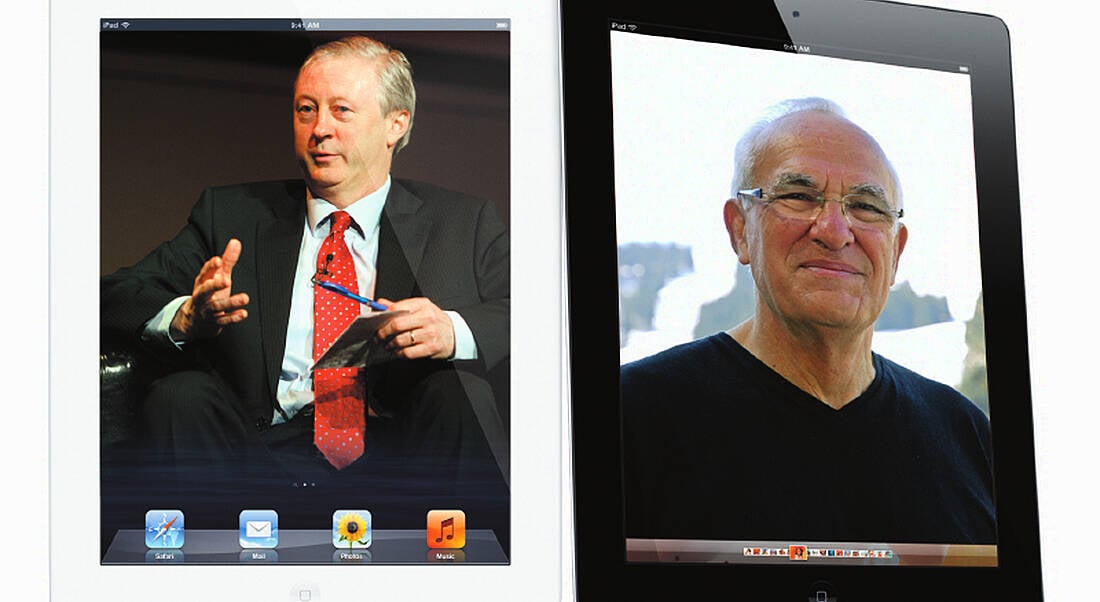Driven by smartphones, ultrabooks and iPads, the consumerisation of IT is driving a whole new trend in workplaces of today – bring your own device (BYOD).
Do a straw poll in any office in Ireland, the UK, Europe or America and ask your staff if the computers and broadband they have at home are better than the beige boxes and ageing BlackBerrys your accountant signed off five years ago, and you’d be surprised.
Many of your workers would rather bring their own devices, or better still many would prefer to work from home or flexibly given the choice. Their broadband is faster, their computers are more powerful and with the rise and rise of social media and the ability to videoconference via Skype or Google+ Hangouts, many figure they would get a lot more work done by working flexibly.
The consumerisation of IT trend – where popular consumer devices like iPads, ultrabooks, MacBook Airs and a bevy of smartphones are the new work tools of choice – is presenting something of a conundrum for businesses.
Some see the whole BYOD trend as an opportunity, while others view it as a descent into chaos in a world where hacking and IT security concerns have never been more rampant.
Frost & Sullivan EU CXO Choice report
But the changes in many cases are coming from the top. More than three-quarters of C-suite executives (CXOs) own at least one tablet computer while 20pc have two or more, according to a recent Frost & Sullivan EU CXO Choice report. Nearly all CXOs report owning iPad devices, which they bought directly from Apple while Dell is the most-owned laptop computer.
But in terms of the troops, Irish employers have yet to embrace flexible working and BYOD policies. Only 11pc of Irish employers are actually doing something about flexible working despite lofty pronouncements by 74pc claiming they are open to it, a recent Microsoft commissioned survey found.
In a report that seems to swerve past the obvious factor that conservative-minded employers prefer to see workers at their desks to believe they are actually working, the survey found that 11pc of employers provide the technology to enable flexibility.
More than 30pc of employees surveyed found they have not received any guidelines for flexible working while 69pc of businesses claim they have policies in place.
Across the world, CIOs and IT decision makers will need to address the consumerisation of IT. This is because workers themselves will work around the beige boxes to come up with faster ways of working, leaving the company open to potential data leakage if policies aren’t put in place.
Policies regarding BYOD

According to IDC, many IT managers are struggling to manage the proliferation of consumer devices invading the enterprise workspace, and the implementation of BYOD policies is being viewed as one answer.
An increasing number of CIO and IT decision makers are feeling the pressure to transform and conform to the top-down push by executives and bottom-up demand from the general employees to support consumer technologies such as media tablets and smartphones.
At the forefront of helping the world’s top CIOs decide what to do around consumerisation of IT and BYOD is NUI Maynooth-based Innovation Value Institute (IVI).
IVI’s IT-CMF framework for CIOs and IT managers sprung from a collaboration between Intel and NUI Maynooth to develop a gold-standard approach to help organisations derive greater value from their investment in IT. The consortium has attracted more than 75 blue-chip members, including Chevron, BP, Cisco, Microsoft, Fujitsu, Boston Consulting Group and Ernst & Young.
The IVI and IT-CMF are the brainchild of Prof Martin Curley, director of Intel Labs Europe. Curley says there are few businesses today that can manage to function without IT and BYOD is a trend that merges well with trends like cloud computing and new device form factors like tablet computers and ultrabooks.
“We have moved into an era where the rate of knowledge and information production has become so fast that we need more technology to manage that.
“At Intel, we are working on what we call the compute continuum, which is all about enabling all these different wireless devices to be managed seamlessly and make it easy for workers to be productive irrespective of whether they are using a smartphone, notebook, iPad or whatever.
“There is going to be a big issue with security but with the consumerisation of IT being a major trend, particularly with new employees coming in – expect it. Very often your home PC can be better than the one you have at work.
“Companies are embracing this because the big implication is that the workers can produce more, faster – previously, you had to come into work to use your computer. Now you can contribute from anywhere and that’s an evolutionary leap in terms of what’s possible.
“But you can’t get away from the security aspect and some companies are enforcing conditions that the company can actually wipe the device at their disposal. At Intel, we have developed technology that if your notebook goes missing you can send a single command remotely to self-destruct the hard disk and wipe it.”
iPad for the interim?
Curley views the iPad as an interim device. “Intel’s massive priority this year is the introduction of ultrabooks.
“Tablets are great for consuming content but for content creation going forward – and there’s a huge amount of content creation that has to happen – most people are consuming knowledge as part of their work and executives find iPads efficient for reading and consuming board minutes. So I think ultrabooks will fulfil the need to be productive on the move.”
Curley cites a meeting he had with a CIO of a large company recently who had the unenviable task of trying to shift thousands of workers from old Windows XP devices to more modern technology – at the rate of 1,000 seats a day.
“Instead, a new solution whereby the organisation devised a flexible BYOD strategy was arrived at. While this puts some of the onus on the employees to self-manage, it means they get to work with a device they want to use and be more productive.”
Curley says there is a gravitational pull towards devices workers want to use and that are easy to use and IT managers and CIOs need to focus on better network management.
“You can let chaos reign but it is better to try and then rein in that chaos.”
No holding back BYOD trend

According to Bernard Guidon, a board member with Aruba Networks, a fast-growing wireless networking player that works with Irish technology companies through its partner DataSolutions, there is no point trying to hold back the flood.
Aruba – a $300m Silicon Valley firm that is only 10 years old and was formed by ex-Cisco employees impatient to embrace the wireless reality – develops wireless technologies that allow employees to remain within the company firewall whether they are on the premises or anywhere in the world on Wi-Fi, 3G or 4G.
“The internet has changed the way we connect and work, and workers on no matter what device, even if it is an iPad or an Android smartphone, need to be able to connect anywhere, at any time to anyone.
“At the same time, firms need to be able to put in place polices and rules that, for example, intelligently prevent certain databases or files from ever leaving the premises or being transmitted.”
Guidon explains that Aruba is currently focusing on deploying wireless solutions with healthcare providers like the NHS that allow doctors equipped with iPads, for instance, to only access specific data sets relating to patients in hospitals when they are within proximity to the patient’s bed.
“The cost of healthcare around the world is too high and consequently there is a need to put digital records in place that medical professionals can access securely and reduce the likelihood of errors.”
Guidon says that military pilots, such as those in the US Airforce, also use the technology when they fly into airports around the world to transmit data over public Wi-Fi networks securely back to HQ.
The consumerisation of IT trend is continuing unabated and workers everywhere will need mobility, while at all times data must be protected, he adds.
“Security and peace of mind are key for IT managers and business managers who increasingly need to provide an easy way to provide access via smartphones and iPads into the organisation.”




